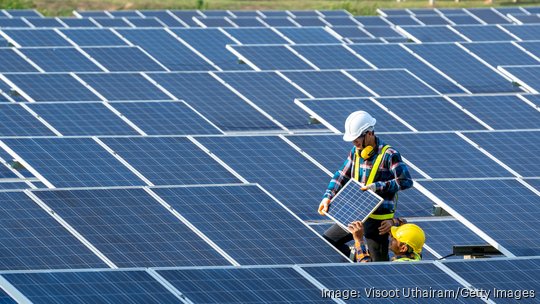
As the energy capital of the world seeks to make its mark in the energy transition industry, local experts say investment must be made in the pipeline to shape the future workforce.
In 2022, Houston was estimated to have 71,305 workers across multiple clean energy sectors, excluding traditional transmission and distribution, according to the Greater Houston Partnership. The figure is the highest since 2019, when the GHP recorded 64,924 clean tech jobs.
Local experts and business leaders said that to continue growing Houston’s clean energy workforce, investment in early education is needed to create a talent pipeline.
Joseph Powell, director of the University of Houston’s Energy Transition Institute, expects demand to increase for workers skilled in electrification projects.
Clean energy technologies, such as green hydrogen and battery storage, are more dependent on a strong knowledge of electrochemistry than traditional energy sources, which rely on thermal chemistry.
“Electrochemistry, which had been a dormant field for multiple decades, is now all of a sudden one of the hottest tickets on the planet when it comes to skillset,” Powell said.
Powell also noted the influence data scientists will have as both traditional and renewable energy sources become increasingly digitized.
Meanwhile, Michael Lee, CEO of Houston-based renewable energy company Octopus Energy, said more investment needs to be made in the trades so customers can reap the benefits of the energy transition. Overhauls to electrical and heating systems would require a knowledgeable workforce, Lee said.
“If we’re going to electrify transportation, electrify heating and hot water, we have significantly underinvested in the trades,” Lee said. “We need way more HVAC technicians than we currently have. Master electricians are in short supply; we have a shortage of electricians in the market to do the important tasks for the energy transition.”
Impact of global and local policy on energy transition workforce
The clean tech workforce's local decline in 2020 and 2021 and upswing in 2022 was due to economic effects from the Covid-19 pandemic and Russia's invasion of Ukraine, Powell said.
While some companies doubled down on an increased need for oil and gas in Europe, others took note of policy developments in the United States and redeployed investments to support domestic energy transition, he said.
“You see a large uptick in activity in that regard that involves clean energy jobs, whether it be on the side of renewables, by electrolyzing water to make hydrogen directly, or a pickup in the carbon dioxide capture which is stored underground to make the clean hydrogen from natural gas,” Powell said.
One of the domestic policies Powell highlighted was the 2022 Inflation Reduction Act, which President Joe Biden signed into law in August of last year. The IRA earmarks $370 billion in funding for climate technology research, and Powell said those incentives translated into jobs as the U.S. attempts to maintain its status as a leader in energy systems research.
Further benefits of the IRA include a slew of grants for university research. Powell, who is involved with grant applications for UH, said the amount was “incredibly intense.”
"We've not only been looking at how to partner on these grants, but [we have] also been looking at the impacts of these technologies on communities," Powell said. "As we roll out some of these new energy technologies, the benefits immediately come back in terms of air quality. As you reduce the amount of fossil fuel combustion and replace that with renewable generation, you have the opportunity to reduce the particulate matter and other pollutants, which is a health improvement opportunity for the for the Houston area."
While the IRA has received praise in the energy sector, some companies are still waiting to see its full impact. During CERAWeek 2023, Energy Secretary Jennifer Granholm heard questions from climate tech business leaders in Houston who wanted more clarity on how those funds reach their technologies. Granholm said the Department of Energy plans to release information about pathways to commercialization through a series of reports, which will compile findings on barriers companies face when scaling products and services to the commercial level.





